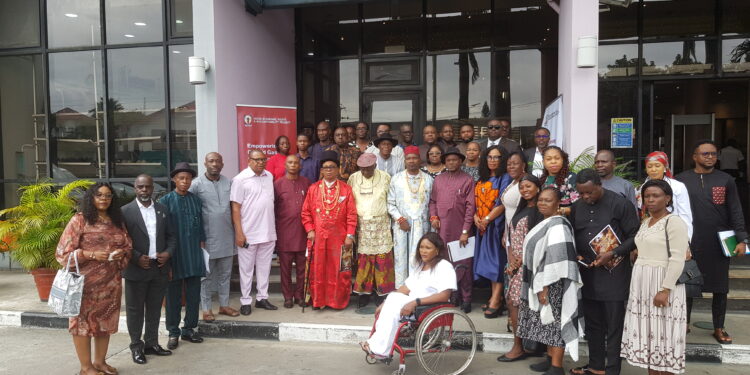The Socio-Economic Rights and Accountability Projects( SERAP) has presented unchecked injustice in Niger Delta communities and Gender Needs Assessment reports, detailing justice issues in host communities of natural resource, historical engagement of host communities of Natural Resource(HCNR)with the legal system, strategic litigation for social and economic rights, impact of gender and social inequalities on access to justice, gender specific barriers, social barriers leading to marginalisation and perception of justice.

It also provided insight into the efforts SERAP was making to promote transparency, accountability and respect for socio-economic rights in Niger Delta region.
The reports were presented at a 3-day interactive session held on Monday, Tuesday and Thursday September 1st, 2nd and 4th, respectively, in Port Harcourt, Rivers state.

Presenting the report on unchecked injustice, the lead researcher, Dr. Olubunmi Afinowi, said that it was the final output of research carried out by SERAP across six states in the South-South region of Nigeria, Akwa Ibom, Bayelsa, Cross River, Delta, Edo and Rivers states.
According to her, the study explored the justice issues confronting the host communities of explorative activities within this region.
“In addition, the research examines gender and social barriers experienced within these communities and how these barriers affect various groups.
“Further, it explores how strategic litigation can be used by these host communities of natural resources(HCNRs) in Nigeria’s Niger Delta to seek justice for environmental, social, and economic rights violations.
” It also examines the role Gender Equality and Social Inclusion(GESI) in shaping access to justice and community empowerment.
” A key objective of this research is to strengthen the capacity of these communities in leveraging strategic litigation as a vital tool for securing effective remedies and fostering broader institutional and.policy changes”, she said.
The lead researcher noted that HCNRs face systemic injustices, including environmental degradation, health crises, economic deprivation, and cultural erosion.
These issues, she said, disproportionately affect women, children and other vulnerable groups.
While defining Strategic litigation as a deliberate legal approach aimed at achieving broader social change and pointing out that it differs from traditional ligation by focusing on precedent-setting, public awareness and policy reform, Afinowi said the review highlighted its potential to empower HCNRs and address systemic injustices.
According to her, the research finds that HCNRs have historically been subjected to environment, social and economic injustices, and have had their rights relegated for the ‘greater good’ of the entire nation.
She said, “This subjugation continues to compel communities into extra judicial means of asserting their rights. The research shows that these means include negotiations, demonstrations and appeals to the government. Some of the strategies, while sometimes expedient, frequently lead to outcomes that fall short of ensuring equitable justice or adequate compensation for environmental degradation and social disruptions.
“In conclusion, strategy litigation serves as a crucial avenue for achieving justice for marginalised groups, including individuals with high levels of vulnerability or specific needs. However, the effectiveness of this approach hinges on several supporting elements: it is imperative to enhance legal literacy among affected communities, so they understand their rights and the legal processes available to them. Additionally, fostering community mobilisation can empower individuals to collectively advocate for their rights and challenge injustices effectively”, she added.
In their goodwill messages, the office of the Attorney-General of the Federation and Minister of Justice, Ministry of Petroleum, National Human Rights Commission, Nigeria Extractive Industries Transparency Initiative, National Oil Spill Detection and Response Agency(NOSDRA), commended SERAP for organizing the event aimed at promoting the use of strategic and public interest litigation in demanding transparency and accountability in the management of natural resources, describing it as apt.
The presentation was attended by community networks and associations, civil society organizations, media, women groups, people living with disability, ministries, department and agencies (MDAs), and other stakeholders in the Niger-Delta region and other oil-producing communities in Nigeria



















